Institutional Effectiveness
The Kankakee Community College Office of Institutional Effectiveness and Assessment is responsible for promoting a culture of evidence and data-driven continuous improvement.
The department provides leadership and coordination for the following college-wide initiatives and activities:
Kankakee Community College is committed to improving academics at the course, program, and institutional levels by assessing student learning and making adjustments to our programs and courses in order to improve student success.
On this site you will find academic assessment plans, current assessment activities and changes being implemented that reflect our assessment data.
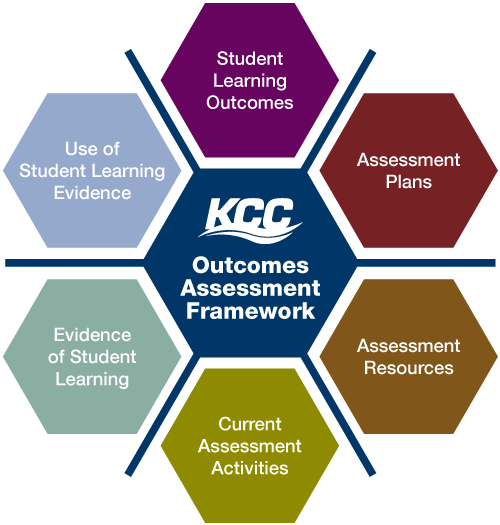
Figure based on National Institute for Learning Outcomes Transparency Framework . Urbana, IL: University of Illinois and Indiana University, National Institute for Learning Outcomes Assessment (NILOA).
Learning Outcomes
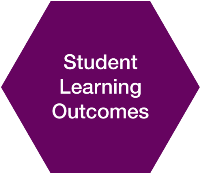
Student learning outcomes statements clearly state the expected knowledge, skills, attitudes, competencies and habits of mind that students are expected to acquire at an institution of higher education.
These outcomes are listed institutionally, through programs, and through courses.
- Institutional outcomes - includes general educational outcomes, as listed below.
- Program outcomes - currently listed with each program in the online Catalog.
- Course outcomes - currently listed on each course syllabus.
Institutional
General Education Outcomes
General Education Outcomes are the knowledge, skills, abilities, attitudes, and behaviors that students are expected to develop as a result of their overall experiences with any aspect of the college, including courses, programs, and student services, both inside and outside of the classroom.
KCC has three General Education Outcomes:
Communication
- Students who graduate from KCC will be able to create and interpret messages within specific contexts and multiple channels and modalities.
Critical Thinking
- Students who graduate from KCC will be able to comprehensively analyze and evaluate issues, ideas, and evidence before accepting or formulating an opinion or conclusion.
Responsibility
- Students who graduate from KCC will model ethical and professional behavior and cultivate an environment supportive of equity, diversity, inclusion, and belonging.
Assessment Plans
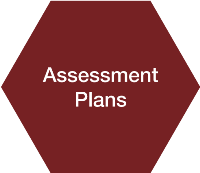
KCC’s assessment processes operate systematically throughout the calendar year as faculty, staff, and administrators plan for, gather, and act on assessment data. Each level of assessment is planned out and reported out yearly through division, program, and institutional reports. College plans for gathering evidence of student learning might include institution-wide or program and discipline-specific approaches that convey how student learning will be assessed, the data collection tools and approaches that will be used, and the timeline for implementation.
General Education plan
| Communication | Critical Thinking | Responsibility | |
|---|---|---|---|
| Fall 2024 | Analyze/interpret/identify recommendations | Collect Data | Report out at inservice/implement recommendation |
| Spring 2025 | Report out at inservice/implement recommendation | Analyze/interpret/identify recommendations | Collect Data |
| Fall 2025 | Collect Data | Report out at inservice/implement recommendation | Analyze/interpret/identify recommendations |
| Spring 2026 | Analyze/interpret/identify recommendations | Collect Data | Report out at inservice/implement recommendation |
| Fall 2026 | Report out at inservice/implement recommendation | Analyze/interpret/identify recommendations | Collect Data |
| Spring 2027 | Collect Data | Report out at inservice/implement recommendation | Analyze/interpret/identify recommendations |
| Fall 2027 | Analyze/interpret/identify recommendations | Collect Data | Report out at inservice/implement recommendation |
| Spring 2028 | Report out at inservice/implement recommendation | Analyze/interpret/identify recommendations | Collect Data |
| Fall 2028 | Collect Data | Report out at inservice/implement recommendation | Analyze/interpret/identify recommendations |
Program Assessment
- Programs maintain a 5-year assessment plan that aligns with their 5-year program review process.
- As faculty teaching in the programs complete their course assessments each semester, they return their results to the program director or coordinator who analyzes the information and creates action plans for future improvements and assessment.
Course Assessment
- Faculty are provided time during the faculty in-service at the beginning of the semester to select one course objective to focus on, and create and submit a course assessment plan around that objective. Many faculty will work within their division or across divisions to create assessment projects that involve multiple faculty.
- Final reports accompanied by two artifacts of student work per faculty member are submitted at the end of the term.
- Reflections and artifacts are available for KCC faculty to view through the Curriculum and Assessment Resources page of the KCC employee portal.
Assessment Resources
Assessment is the process of gathering and interpreting information about student learning. It is evidence that provides an outward sign of “proof.” It may be one of many variables contributing toward success. The real question is not whether we are doing a good job teaching but are we systematically reviewing, documenting and assessing the relevant evidence? It gives us the power to share the success of our courses or programs. It provides an ongoing process to continually improve teaching and learning effectiveness.
The Student Learning Committee
KCC’s assessment processes are organized and implemented by the Student Learning Committee (SLC), which leads the charge “to develop, revise, and monitor the implementation of the college’s plan for measuring effectiveness in meeting established learning outcomes for students.” The SLC is comprised of faculty representation from each academic division of the college, as well as staff in Institutional Effectiveness, the Library and Student Success Center, Student Activities, and the Equity, Diversity, and Inclusion Center. The SLC members act as a resource to academic and non-academic departments, programs, and committees as well as individual faculty and staff to assess student learning outcomes.
The Handbook
The KCC Assessment Handbook provides you with information to successfully develop and complete classroom, course and program assessments. You’ll find examples of assessment techniques, report forms and answers to often-asked questions.
Current Activities
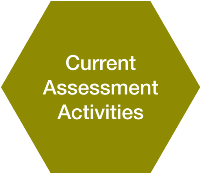
Current assessment activities include information on a full range of projects and activities recently completed or currently underway to gauge student learning, make improvements or respond to accountability interests.
- In response to General Education Assessment project recommendations, the Student Learning Committee is currently working on creating an online repository of assessment examples to be used by faculty and staff to gather ideas for future assessments.
- In the Fall of 2024, the Student Learning Committee will be completing analysis of data and artifacts submitted in Spring 2024 for the Communication outcome. The committee will also be collecting data and artifacts for the Critical Thinking outcome this semester for analysis in the spring.
- Faculty in the Math department select course objectives that students struggle with to assess. For example, in Contemporary Math, students struggled with the Logic unit. The instructor implemented new learning strategies, and the average grade went from 76.8% to 83.3% from Fall 2019 to Fall 2022. Also, the proportion of students who passed the unit went from 73.3% to 77.3%. Similar work now continues for an instructional unit on Finance.
Evidence of Student Learning
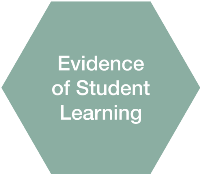
Evidence of student learning includes results of assessment activities. This may include evidence of indirect (e.g. surveys) and direct (e.g. assessment) student learning as well as institutional performance indicators (e.g. licensure pass rate).
General Education
Course Assessment
Use of Evidence
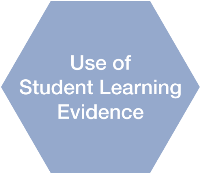
- When recent program/discipline review data indicated low student success rates in the Anatomy and Physiology sequence, the college invested in embedded tutoring for students in those disciplines.
- In a Program/Discipline Review of Developmental English, an opportunity to create co-requisite work was identified. Since Fall 2021, the English department has been performing ongoing assessments of our Accelerated Learning Program (ALP). KCC began offering ENGL-1423 in the Fall 2020 semester and discovered some problems as a result of both quantitative (e.g., student success scores) and qualitative data (e.g., student and faculty feedback). Each semester, the English faculty have been meeting to discuss the data and develop plans to address findings. Following this process in Spring 2022, the English faculty decided to pilot a different ALP model that would still enable underprepared students to complete English I in a single semester. In the new ALP model, students take ENGL-1422 in the first six weeks of the semester and, if they pass that class, continue onto a 10-week section of English I rather than the previous model where students were taking ENGL-1423 and ENGL-1613 throughout the same term/semester (working in both classes at the same time). Through ongoing assessment of student success data and feedback from faculty and students, the English department determined that this new model better suits students compared to the previous model. As a result, the department retired ENGL-1423 entirely and fully adopted the ENGL-1422 approach instead.
- In response to General Education Outcomes assessment findings, the Student Learning Committee provided additional professional development opportunities for formative vs. summative assessment, tips for assessing communication, and the assessment of EDIB.
- In tandem with work being completed by the Equity Planning Team and the EDI Committee, additional professional development has been created for faculty in regard to creating an inclusive classroom.
Accreditation at KCC
KCC is accredited by the Higher Learning Commission (HLC) which accredits degree-granting post-secondary educational institutions. The college participates in the Open Pathway and has its next comprehensive evaluation in 2024.
Additional information about accreditation is available from KCC’s director of institutional effectiveness and assessment, who serves as the accreditation liaison officer.
You can contact the Higher Learning Commission at 230 S. LaSalle St., Suite 7-500, Chicago, IL 60604, 800-621-7440 or visit hlcommission.org.
College Recognition
KCC is Recognized by the Illinois Community College Board (ICCB) through September 30, 2029. KCC is scheduled to complete its next Recognition process in 2028.
Programmatic Accreditation
The college also seeks specific programmatic accreditations in the following areas. Accreditation status and program outcomes are located in the College Catalog within each program listed. Here is a summary of the most recent licensure pass rates.
| Program | Accrediting Body | Initial Accreditation | Most Recent Accreditation | Next Reaccreditation |
|---|---|---|---|---|
| Paramedic (Riverside) | Commission on Accreditation of Allied Health Education Programs (CAAHEP) | 3/20/2015 | 1/16/2020 | 3/31/2025 |
| Registered Nursing | Accreditation Commission of Education in Nursing (ACEN) | 10/1/2015 | 10/20/2020 | 10/1/2028 |
| Practical Nursing | Accreditation Commission of Education in Nursing (ACEN) | 7/19/2017 | 10/20/2020 | 10/1/2028 |
| Respiratory Therapist | Commission on Accreditation for Respiratory Care (CoARC) | 9/19/2008 | 3/1/2018 | 3/31/2028 |
| Physical Therapist Assistant | Commission on Accreditation in Physical Therapy Education (CAPTE) | 4/19/2011 | 5/4/2016 | 6/30/2026 |
| Medical Laboratory Technology | National Accrediting Agency for Clinical Laboratory Sciences (NAACLS) | 10/26/1981 | 9/27/2019 | 10/31/2029 |
| Phlebotomy | National Accrediting Agency for Clinical Laboratory Sciences (NAACLS) | 9/21/2012 | 9/27/2019 | 10/31/2024 |
Individuals or other organizations and institutions who want to conduct research involving human subjects at KCC must have their work reviewed by the Institutional Review Board. KCC’s Office of Institutional Research oversees the work of the Institutional Review Board.
If you have any questions, please contact Lesley Cooper, Director of Institutional Effectiveness & Assessment, lcooper@kcc.edu.

IR Services
In support of KCC’s mission “Enhancing quality of life through learning,” the Office of Institutional Research collects, analyzes, interprets and reports data to lead institutional effectiveness. Institutional Research services and data are listed above. They:
- Facilitate data-informed decisions by the academic division, student support services, operations, and leadership
- Support strategic planning
- Lead college-wide accreditation
The KCC Office of Institutional Research is a member of both the national and state Associations for Institutional Research and upholds its Code of Ethics.
KCC Data Book
Fact Sheets
FY20-FY25 Strategic Plan
Background:
The core values represent shared beliefs about the qualities that reflect KCC’s essential characteristics. In fall 2008, KCC faculty and staff voted on the core values that best represent the college and describe how they expect themselves and others to behave, set standards, and drive the organization’s priorities.
The college vision and mission were established over 20 years ago, and have been affirmed by the Board of Trustees annually.
In developing KCC’s strategic plan, the college focused on 5 strategic priorities: Institutional Culture and Diversity, Excellence and Innovation, Access and Value, Partnerships and Collaboration, and Success. Goals were created from these strategic priorities.
The goals and actions plans for the FY2020- FY2025 strategic plan were developed from:
- Focus groups and surveys (with community leaders and current students),
- Labor Market Analysis and the Data Book (college-wide data),
- #IdeaFest2018 (employee input), and
- Strategy Mapping results (college leadership input).
VISION: The ideal for KCC
KCC is a flexible organization where teamwork is the expectation and student/client success the driving force. Our shared vision is to be a leader in creatively and rapidly responding to our community’s educational needs, emphasizing quality, affordability, and effective partnerships.
MISSION: The “what and why” of KCC
Enhancing quality of life through learning.
VALUES: The attributes we nurture and maximize to benefit each individual and the college Respect, Excellence, Learning, Integrity, Collaboration
GOALS: Strategies to achieve the mission
TARGETS: Metrics that show whether current performance is on track to achieve goals
GOAL 1
Improve student success through increased enrollment, retention, transfer, and completion rates.
Rationale: To achieve the mission of KCC, we will optimize the methods by which we reach potential and current students. Developing a comprehensive system to improve recruitment, retention, and completion rates is critical to improving student success.
GOAL 2
Create diverse, inclusive, and equitable teaching, learning, and work environments.
Rationale: KCC’s commitment to its core values fosters diverse and inclusive environments. KCC seeks to achieve equity in success outcomes for all its students and employees.
GOAL 3
Improve physical and virtual teaching and learning spaces.
Rationale: To increase student engagement in the classroom and beyond, we will accommodate various learning and teaching styles. Transformed learning spaces and integrated technology enable student engagement with instructional materials, peers, and faculty.
GOAL 4
Increase visibility and value in the community.
Rationale: As an open-access community college, KCC furthers the Illinois Community College Board (ICCB) mission of educating students and preparing a skilled workforce. To realize this mission, KCC will optimize the value we add to the K-12 school system and to the local economy. Expanding partnerships with businesses and schools in the district will strengthen career and transfer pathways for the students we serve.
GOAL 5
Provide development opportunities to enhance KCC employee skills and knowledge.
Rationale: To optimize the mission of KCC, the professional development of employees is critical. This goal is the culmination of a 2018 AQIP Action Project and a college-wide initiative focused on improving the employee culture and customer service (“Cavaliers Care” and the “Bucket Initiative”). Further, a skilled employee base engages KCC in its core beliefs of excellence and learning.
The Grants Development Office consults with faculty and staff who wish to pursue external funding for projects that align with the college’s strategic goals. The office also:
- Leads the Grants Committee in review of proposals by faculty and staff. The committee determines if grants should be pursued with college resources.
- Fosters an environment of transparency by maintaining a database of grants and funding sources.
Getting Help with Grant Development
To pursue a grant, first complete a Grant Feasibility Form for review by the Grants Committee. After given approval to proceed, the Grants Development Office will:
- Provide consultation and guidance on the project plan to the program director, who will be the writer of the grant proposal and director of the proposed grant-funded program. Guidance will be given on the full grant proposal process, including aligning objectives with strategic goals and programmatic needs, outlining the writing process, and formulating the evaluation plan.
- Furnish a standard college profile for the proposal, and assemble and analyze research data including national, state, local and college demographics and statistics.
Creating a Grant Proposal
After strategizing the Grant Development Process with the grants development director, the program director of the grant may move forward in writing and finalizing the grant proposal. This includes:
- Analyzing the purpose of the proposal, outlining programmatic needs and finalizing the writing process.
- Writing, formatting, and editing the proposal.
- Garnering support from various stakeholders including institutional departments, local government agencies, and school districts who become important partners.
- Submitting the proposal.
- Coordinating the implementation of the grant if awarded, and leading the program through the grant award period.
Grant feasibility form
The Grant Feasibility Form must be completed for all grants over $5,000 (excluding TRIO) so KCC resources may be allocated for projects aligned with our strategic goals.
Send the completed form to Lesley Cooper, Director of Institutional Effectiveness & Assessment Development, at lcooper@kcc.edu at least 60 days before your grant submission deadline.
After review by the Grants Committee, you will be notified of KCC’s decision on whether to move forward with the proposed grant no later than 45 days before the grant deadline.
Contact Lesley Cooper in advance with any exceptions requested of this timeline.
If you have any questions, please contact Lesley Cooper, Vice President for Strategy and Institutional Effectiveness, lcooper@kcc.edu.